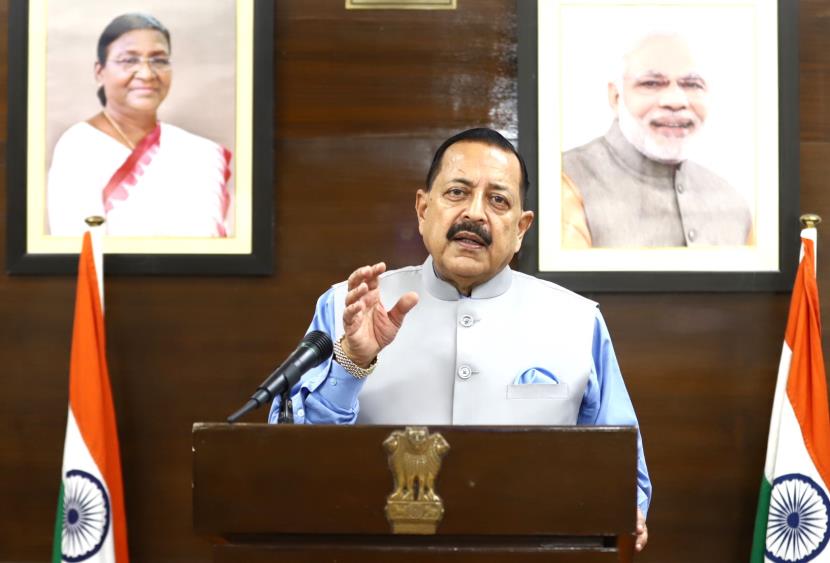We owe it to next generation to preserve environment: Dr Jitendra
'World Environment Day'

Jun 05, 2025
NEW DELHI: Addressing a programme, as chief guest, on the occasion of the "World Environment Day" today, Union Minister of State (Independent Charge) for Science and Technology; Earth Sciences and Minister of State for PMO, Department of Atomic Energy, Department of Space, Personnel, Public Grievances and Pensions, Dr. Jitendra Singh said, "we owe it to the next generation to preserve the environment for them".
The Science & Technology Minister reaffirmed India's leading role in global climate action, urging citizens and institutions alike to adopt sustainable practices as a national duty. Addressing the TATWA event today virtually-Transforming (Emissions) Air, (Rising) Temperature, Water (Quality) through Climate Actions-organised by the Department of Science and Technology (DST) here on the occasion of World Environment Day. He underlined that India's approach to climate resilience is rooted in both scientific innovation and public participation.
"Earth gives us everything-clean air, fresh water, fertile land. But we take these gifts for granted," Dr. Jitendra Singh said, addressing a packed hall of scientists, policy makers, start-ups, and students. Warning of the increasing threats from pollution, deforestation, and climate change, he said that combating these challenges must become a collective responsibility, enabled by behavioural change and lifestyle-driven movements like Mission LiFE-Lifestyle for Environment.
The Minister spotlighted India's bold climate pledges under Prime Minister Narendra Modi's leadership, particularly the ‘Panchamrit' commitments announced at COP26. These include achieving 500 GW of non-fossil fuel energy capacity and meeting 50% of energy needs through renewables by 2030, cutting carbon emissions by 1 billion tonnes, reducing carbon intensity by 45%, and achieving net-zero emissions by 2070.
Dr. Jitendra Singh also emphasised the strategic role of the Department of Science and Technology in realising these goals. He pointed to two national climate missions spearheaded by DST under the National Action Plan on Climate Change: the National Mission for Sustaining the Himalayan Ecosystem (NMSHE), and the National Mission on Strategic Knowledge for Climate Change (NMSKCC). Both aim to strengthen climate research, protect fragile ecosystems, and build long-term sustainability.
DST, the Minister said, is heavily investing in building scientific infrastructure and capacity. Key initiatives include India's second Ice-Core Research Facility at the University of Kashmir, the installation of automated weather stations, and high-end computing capabilities across academic institutions. Dr. Jitendra Singh also highlighted the growing role of youth in climate innovation, citing IIT Mandi's ‘Himalayan Startup Trek' as a standout initiative supporting start-ups focused on mountain ecosystem challenges.
In a significant policy push, DST has launched a special call to support research in urban climate and extreme events-acknowledging the rising vulnerabilities of Indian cities. On the mitigation front, DST is advancing cutting-edge work in decarbonisation and clean energy through initiatives like Hydrogen Valley Innovation Clusters (HVIC) and Carbon Capture and Utilisation (CCU) technologies for the power and cement sectors. These programmes have also enabled robust international partnerships with countries such as the UK and Sweden under the Mission Innovation framework.
Complementing these efforts, several CSIR labs-including IICT, NCL, NEERI, NIIST and IIP-are working on technologies ranging from green hydrogen and biodegradable polymers to waste-to-wealth solutions and climate-friendly building materials.
The Minister also highlighted India's BioE3 Policy-Biotechnology for Economy, Environment, and Employment-as a vital component of the country's Net Zero Carbon Economy roadmap. The policy promotes a circular bioeconomy by supporting biomanufacturing, bio-based chemicals, and climate-resilient agriculture, while fostering public-private partnerships to scale up biotech innovation and employment.
Broader climate strategies were also outlined, including the National Policy on Blue Economy, which aims to optimise maritime resources in sectors like fisheries, tourism and ocean energy. The Prime Minister's recent ₹50,000 crore development push in Bhuj was cited as evidence of India's commitment to sustainable ocean-based growth. Initiatives like ‘Mission Mausam' were also showcased as vital to enhancing India's weather surveillance and climate resilience using next-generation forecasting technologies.
Dr. Jitendra Singh described these diverse investments as a "testimony of the urgency and importance the Government of India accords to climate action." He concluded by congratulating the DST team for organising the TATWA event and steering India's research-driven sustainability agenda. "Under the leadership of Prof. Abhay Karandikar, Secretary, DST, and the guidance of Dr. Anita Gupta, Head, CEST Division, DST is laying the foundation for a science-led, people-powered green future," he said.
The event was attended by prominent dignitaries including Prof. Abhay Karandikar; HE Ms. Marisa Gerards, Ambassador of the Kingdom of the Netherlands to India; Dr. R.R. Sonde, Professor Emeritus, BITS Pilani; and Dr. Anita Gupta, along with a vibrant audience of international scientists, entrepreneurs and students.